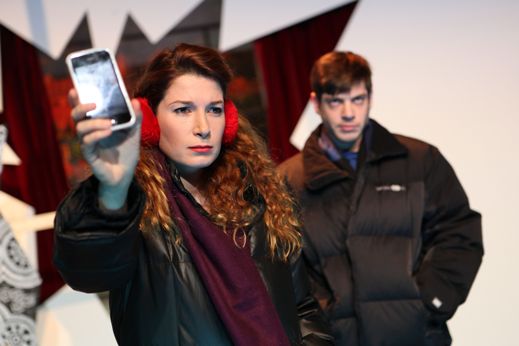
Documentary theatre is a form rarely seen in Israel, and audiences attending last night’s performance of “They Call Me Jeckisch” may not have known what to expect. What took place was a riveting, emotionally intense evening for actors and audience alike. It was apparent that the theatrical form has much in common with its cinematic counterpart, and carries a certain element of risk. Once you embark on a documentary project, you do not know what you will discover. When authenticity and accuracy are the signposts for the journey, the path and process may well become part of the play and performance.
“They Call Me Jeckisch” written by Nina Gühlstorf and Nina Shteinhilber, directed by Nina Gühlstorf, and performed by Michael Hanegbi, Hadas Kalderon, Ute Baggeröhr and Frank Wiegard, was created as part of Family Ties. A co-production of the Beit Lessin and the Heidelberg Theatre, the project began a little over a year ago in Israel, with the entire team – director, dramaturg and actors – conducting interviews with Israelis of German background: colloquially known as ‘Yekkim’ (Jeckisch). The recorded interviews were transcribed and formed the basis for creating the script, with the Israeli actors arriving in Germany in December 2009, to work on the project.
The Jeckisch or ‘Yekkim’, as they are known in Israel, are an entity unto themselves: literate, musical, fastidious, hardworking and punctual to a fault. The caricature almost draws itself; it is all too easy to come up with a plethora of funny stories. Yet, don’t forget: this is a Jewish joke; at the heart is a painful truth. The unswerving dedication of the Yekkim is to a culture from which they had to flee in order to survive, while the culture they barely deign to acknowledge was their refuge. How can you talk about the Jeckisch without talking about the Holocaust?
Can Germans and Israelis work together on such a project, without their personal stories becoming implicated in the process? Apparently not.
Yet the materials – whether collected in research or personal, are not theatre. Theatre is a question of how you work with the material. Nina Gühlstorf and Nina Shteinhilber have created a compelling theatrical work independent of the subject matter, perhaps even despite the subject matter. From a critical perspective, I often have a certain reticence in approaching texts and performances dealing with the Holocaust. While I strongly believe in the importance of documenting, studying, attempting to understand and preserving the memory of the individuals who perished and the European Jewish culture that was obliterated, I am always conscious of the difficulty involved in conveying this in a way that does not sentimentalize, trivialize or exploit the subject.
The stories of the Jeckisch are interwoven with the encounter between the German and Israeli actors, and the experience of the Israeli actors coming to Germany for the first time; confronting their own feelings and family history. The line between fiction and reality becomes blurred: Gühlstorf and Shteinhilber use that to their advantage. The fast pace of the performance, with a density of information and seamless shifts in character create a disturbing uncertainty in the viewer. That feeling of uncertainty perhaps facilitates the approach to this subject matter, opening minds and hearts to exploring the perspective of the other, and the difficulty of sustaining contradictory thoughts, feelings and impulses.
The co-existence of difficulty and absurdity is reflected in the set designed by Noa Tsaushu and Asaf Koriat, with the artistic consultation of Sebastian Hannak. Torn fragments of brown cardboard boxes are layered to create a tall wardrobe with a solitary fur coat on a hanger. Another large cardboard collage sprawls on one side of the set, while on the other end a table is set for an elegant tea, with a small plastic Israeli flag stuck in the teapot. The actors walk onto the set. Ute Baggeröhr is first, gingerly inserting herself into the fur coat, emblematic of the dissonance between the Jeckisch and Israel. The two men are next – Frank Wiegard in a white button down shirt and jacket, and Michael HaNegbi in a T shirt. But when Hadas Kalderon walks to the front of the stage with a smile, twirling the small Israeli flag in her hands, the ante is raised.
Moving in and out of different characters, voices and stories, the actors reveal layer after layer of identities and perspectives, challenging one another and the audience. Frank Wiegard delivers the monologue of a man who left Berlin at the age of seven, saying, “For me Germany is a country just like any other country” and of his grandparents who remained behind in Berlin that “they died a natural death.” He is challenged by Hadas Kalderon: “Really? Is that what you think?” And the chase begins as the actors relive the process of creating the play, as part of the play – telling the stories of the Jeckisch and conveying the internal contradiction of being Jeckisch through their personal encounters.
The tension is at times excruciating and it is clear that the process of creating the play must have been somewhere between exorcism and therapy. Yet the play and performance of the talented ensemble cast is also entertaining, funny, and thought-provoking.
AYELET DEKEL





